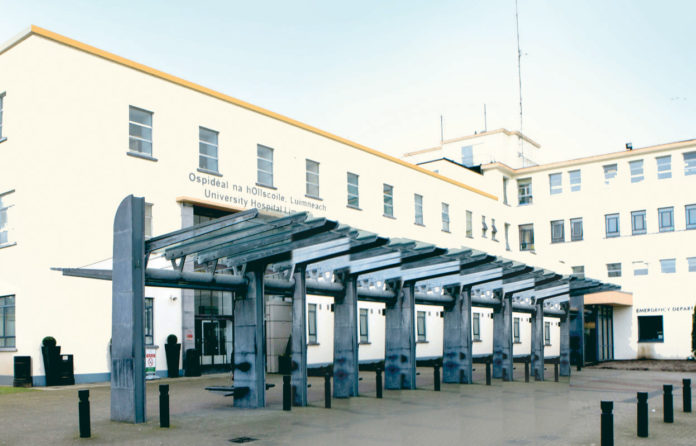The hospital which provides the only 24-hour emergency department across Limerick, Clare, Tipperary, and parts of North Cork, was crowded with 82 patients on trolleys, today.
This included 61 patients on trolleys in the ED as well as 21 patients on trolleys on wards, the highest number since the coronavirus pandemic began.
As of March 30, there were 14 COVID patients and 26 suspected cases being treated at UHL.
There were seven general beds available and only two critical care beds available.
The UL Hospitals Group said it was “managing extremely high levels of presentations” at the ED, today, “while continuing to manage demand for inpatient beds from people with active COVID-19 infection, and those who have been de-listed but continue to recover from the disease”.
“The ED at UHL is the Mid-West region’s main emergency treatment admission pathway for COVID-19 patients, and we ask the public to help us protect the safety of all patients and staff by only presenting at the department in the event of a genuine life-threatening emergency or illness.”
“Attendances at our ED have regularly exceeded 200 per day over the past month, compared with average daily attendances of 197 during 2019. During March 2021, attendances of (over) 200 at the ED have been the norm, with average week-day presentations running at approximately 211.”
“Between 8am on Monday and 8am this morning (Wednesday), a total of 490 patients attended the ED (249 on Monday, 241 on Tuesday),” stated the group.
“We are sorry that any admitted patient faces a long wait for a bed, and we are focusing on all aspects of patient flow, including access to diagnostic tests that help ensure patient discharge or transfer in a timely manner.”
“All efforts are being made to ensure that physical distancing is maintained, and wait times are kept to a minimum, and we want to reassure the public that all our patients continue to receive expert medical care while they wait.”
The hospital group added: “Not all patients are waiting on trolleys in the Emergency Department. Most are in designated bed spaces (cubicles, bays and beds) in the ED (our COVID-19 emergency admission pathway), and in the non-COVID emergency admission stream of the Acute Medical Assessment Unit and Acute Surgical Assessment Unit.”
“Admitted patients are also waiting in designated surge capacity. However, this in no way minimises the upset and inconvenience that people feel when they experience lengthy wait times for a hospital bed.”
It said there is “a range of alternatives” to the ED, “for less serious illnesses, including family doctors, out-of-hours GP services, and local pharmacies”.
Local injury clinics are also operating at Ennis and Nenagh Hospitals (8am-8pm daily), and St John’s Hospital (8am-7pm daily) and “are an excellent option for treatment of broken bones, dislocations, sprains, strains, wounds, scalds and minor burns”.
“If you do have symptoms of COVID-19, it is important that you do not go to the Emergency Department or your GP. Ring them in advance for advice, and avoid contact with other people by self-isolating.”
“In a medical emergency if you have severe symptoms, call 112 or 999. However, if you are seriously injured or ill or are worried your life is at risk the ED will assess and treat you as a priority,” it said.
Limerick Sinn Féin TD, Maurice Quinlivan, condemned the government’s “lack of response” to the trolley crisis in Limerick.
Deputy Quinlivan described numbers of patients waiting on trolleys in Limerick as “astronomical, when considering we are in the middle of a health pandemic”.
“The number of people waiting on trollies (in Limerick) has exceeded 1,000 this month. That is over 1,000 people who have been treated on trolleys and in corridors. In March 2020 there was 334 people on trollies, this month’s figures are an incredible increase,” said Deputy Quinlivan.
“It is not acceptable for suffering patients to be treated like this and it is not acceptable for our health professionals to be working under such strained conditions.We remain at a very delicate stage with regards to the suppression of the Covid-19 virus.”
“The latest strain of the virus is known to be even more infectious and severe. Having so many people on trolleys is a great risk when we consider how infectious this disease is.”
“The hospital requires decisive intervention,” he said.
Deputy Quinlivan said he learned, during a recent HSE briefing, that a proposed 96 bed unit for the hospital “will not deliver 96 new beds”, and that “half of this unit will be to replace existing beds within UHL”.
“At a time of such high trolley numbers it is imperative that all these beds are new beds. Efforts must be made to ensure this happens and 96 new bed are delivered.”











